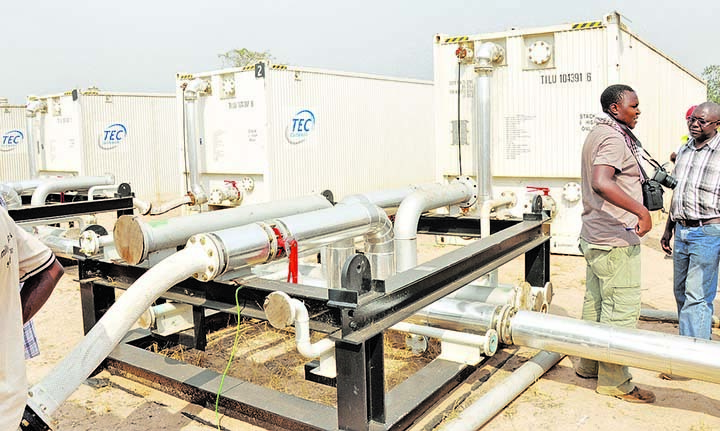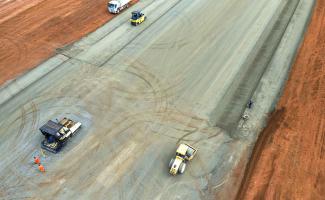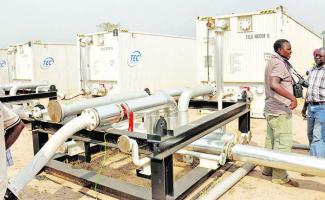
Gloria Sebikari, the Petroleum Authority of Uganda communications manager, said her organisation will liaise with the responsible departments, like the ministry of works and Uganda National Roads Authority, to deal with some issues.
Are Ugandan logistics firms ready for oil jobs?
An oil rig on the shores of Lake Albert. A lot of equipment will have to be transported into Uganda once oil production starts
Tonnes of equipment and materials are expected to be imported to establish oil production facilities in the Albertine region, but questions linger as to whether Ugandan logistics entrepreneurs would benefit from the deals.
The facilities to be built in the upstream phase include two central processing facilities (CPFs) and feeder pipelines at Kingfisher and Tilenga oil fields in Kikuube and Buliisa districts.
These are to deliver crude oil to the industrial park at Kabaale sub-county in Hoima district. At the industrial park will be a 60,000 barrel-per-day oil refinery, from which the multi-purpose pipeline and the 1,445km East African Crude Oil Export Pipeline (EACOP) that will deliver crude oil to Tanga Port in Tanzania will be constructed.
It is anticipated that the construction of these and related facilities will last three years, while the feeder pipeline will last 12 months after the announcement of the final investment decision (FID).
The Government is constructing an international airport at Kabaale in Hoima to airlift some of the sensitive cargo to be used in constructing the facilities, especially the oil refinery a short distance away.
The rest of the equipment will be moved by road for 900km along the northern corridor from Kenya's seaport of Mombasa and through Tanzania along the central corridor to Uganda's oil region.
The logistics and traffic movements report of the Environmental and Social Impact Assessment-ESIA estimates that at peak, over 2,000 truck deliveries per month will be required to deliver equipment to the Tilenga CPF.
But players in the local logistics sector are saying they face a lot of constraints which may easily block them from grabbing opportunities in this phase of the oil and gas developments. The constraints they cited include the lack of enough certified drivers, companies and capital.
The regional Lorry Drivers Association indicates that there are about 20 trucking firms and about 450 truck owners and crew.
But they said constraints exist and could haunt them at the wrong time and therefore they need the Government to help them deal with them urgently.
At stake is the 80% share of the $20b slated for investment in the upcoming upstream stage, which is earmarked for logistics and transportation of materials.
It is not clear whether the country has enough capacity and certified firms with professional driver training standards, approved health, safety and environment safeguards to work in the sector.
However, the law stipulates that oil firms, contractors and sub-contractors give preference to goods produced or available in Uganda and services which are rendered by Ugandans.
Oil storage tanks in the Albertine region. Uganda hopes to start production before 2023
OTHER CONSTRAINTS
Silvestre Katusiime who holds a professional driver training standards certificate from Kenya says the problem is not only on whether there is a capacity by drivers but other capacities as well.
He pointed out road safety conditions and quality explaining that some roads and bridges cannot contain high traffic volumes and weight.
The Government in 2013 revealed plans to conduct a detailed logistics assessment study and identify gaps and dam them.
Robert Kasande, the energy ministry permanent secretary, said: "We are looking at the whole supply route all the way from Mombasa to Hoima and see what adjustments we will have to make. Focus would be on the bridges that cannot support certain tonnages of trucks which will be transporting equipment …"
CIVIL SOCIETY
Monic Kaahwa, a statistician with Mid-Western Region AntiCorruption Coalition (MIRAC), called for affirmative action to help the local drivers get credit to invest in procuring equipment. She said there is also a need for a holistic training and certification programme that would prepare and tap into the opportunity.
This way, they would also stand better chance to enter the national suppliers' database. The Government rolled out the registration of Ugandan entrepreneurs on the national suppliers' database, which is the pre-requisite for participation in the oil and gas deals. Kaahwa's other concern is that most local truck owners and drivers are not conversant with such nitty-gritties, adding that there is a need to dedicate time to sensitise them.
She also said there is need to increase certification by decentralising such services and opening coordination centres in the oil-rich areas.
According to Sylvester Katusiime, there is also need to deal with freight transportation bureaucracies at border points. He said processes need to be streamlined now that cargo is set to increase with the oil activities. He called for adequate and timely investments in modernising other modes of transport such as water, air and railway to ease the burden on the roads.
REGIONAL MEASURES
The regional governments introduced a one-stop-border post for the clearance of the cargo along Uganda-Kenya Malaba border post, which somehow relieved Ugandan truck drivers of congestion and lengthy delays at the two sea gateways of Mombasa.
Now, cargo coming from Kenya only stops at the Ugandan side for joint inspection and clearing of trucks carrying goods takes four hours compared to the two days before.
Gloria Sebikari, the Petroleum Authority of Uganda communications manager, said her organisation will liaise with the responsible departments, like the ministry of works and Uganda National Roads Authority, to deal with some issues.
"There has been significant progress on the construction of the 10 critical oil roads. Works have started to ease transportation bottlenecks and boost local players' competitiveness in the sector. We always sit with stakeholders to share updates and regularly identify challenges to come up with tangible solutions," Sebikari explained.
Sebikari said more plans are being made to help the logistics sector to benefit from the oil deal, though she did not say what exactly is being done.
According to sources, construction of the Nile Bridge connecting Nwoya and Buliisa district where Tilenga oil industrial park is being done. This, they said, should be used to ease movement of oil equipment.



